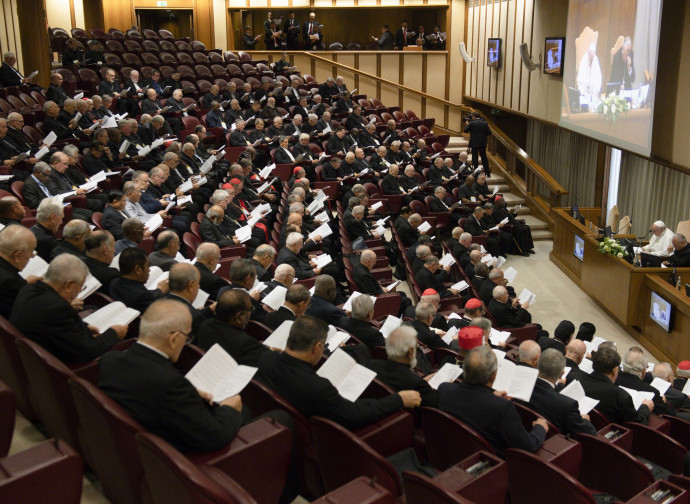The Church prepares for the Synod in silence and divided
The preparation for the Synod which opens on 4 October is scarcely participated by the People of God. On the other hand, there’s growing conflict among those involved. Not exactly a good start.

The first assembly of the Synod on Synodality opens on October 4: the second will be held in 2024. One wonders what will happen at this synod and what will happen to the Church as a result. In this regard, there are many responses. In addition to rightly asking what will happen at the Synod, perhaps it is also helpful to consider the state the Church is in to address it: how does the Church present itself at the start of the Synod? Is She confident in herself? Does She have clear ideas? Is She certain? Does She go there with a solid theology? Does She you go there with a clear teaching? If these conditions exist, some will say, there is no need for the Synod. If these conditions do not exist, others will say, a synod would be very dangerous. Whatever the case, trying to clarify the situation of the Church in advance on the eve of the Synod is worthwhile.
The first observation to make is the silence surrounding the Synod. Let's be clear, insiders have talked about it and talk about it a lot. Issues of specialised magazines completely dedicated to the Synod have been published. But, one wonders whether the majority of Catholics know that the Synod will take place, are aware of what it will be about and, above all, are aware of the serious problems on the table. The numbers of the involvement of Christians in the preparatory listening phase are very low. There is a deficit of information (and therefore participation) which clashes with the emphasis on synodality. In parishes, no one talks about the Synod. It’s not mentioned in homilies. It is said that the topic is systematically avoided in conversations between priests and in diocesan meetings. Even the bishops, at least in their majority, are silent on the topic and no one knows what they think.
This silence is quite disturbing and speaks to us of an uncertain and hesitant Church, with a large grey mass, which suffers the event without understanding and without conviction. If disconcerting choices were to emerge from the Synod, perhaps a large part of this silent mass would say nothing about it, as it said nothing after Amoris laetitia, but it could also be that this silence is a prelude to passive resistance and that it can already be considered such today . This "Church of silence" could then speak, at least with deeds if not with words.
We can also include in this zone of silence the proliferation of slogan-words that cover the synodal issues with a cloak of tired and repetitive habit. The expressions are always the same, from Francis' speech in 2015 on the fiftieth anniversary of the establishment of the Synod of Bishops up to this year's Instrumentum laboris: process, lifestyle, walking together, listening, consensus... They are words by now without meaning, due to their excessive abuse.
If, in speaking of silence, we mentioned an uncertain and hesitant Church, observing instead the world of the "competent" we find a very divided Church. By competent I am referring to cardinals and bishops who intervene publicly on the topic both for and against the spirit of the Synod, theologians, journalists, Catholic intellectuals and the whole world who continually comment on blogs and social media. Here the contrast is very strong and confirms that the Synod, as it was conceived, will not just be a synod, but is proposed as a radical change in the life of the Church. It's as if we were faced with an either/or situation. What strikes and animates the conflict is the realistic belief that this Synod, not dealing with particular themes but with synodality as an aspect of the whole Church, could be revolutionary and light a great fire to the detriment of tradition.
Thus we have Episcopal Conferences that call each other to order, such as the Polish and the German ones. We have cardinals who consider synodality as a "toxic nightmare" (Pell), who say they pray every day so that the Synod will not be held (Burke) or that the Church is on the edge of a precipice (Müller). Other cardinals, however, announce that from now on they will bless homosexual couples in church (Marx), hoping that the Synod will foresee this as a stable possibility. There are cardinals who withdraw from the Synod, withdrawing from the nomination (Ladaria), and bishops who announce not to apply any decisions of the Synod that conflict with tradition (Strikland) and, under threat, declare that they will not resign of their own free will, provoking the appreciation of high prelates (Müller, Viganò). There are also groups of faithful who write to the Pope and ask him to stop.
Meanwhile, there is war between theological magazines. Those of the Jesuits, not only the Italians, are rapidly pushing for reform. Those of the "moderate centre" are dedicated to examining the concept of synodality in depth, arguing that so far, it has not yet been clarified. In this way they try to slow down the process. Traditionalists critically examine the relationship between synodality, collegiality and conciliarity, thus also going as far back as Vatican II.
It must be recognised that the next Synod has already produced some effects, even before it has begun. Communication codes have become more complicated, tempers have flared and conflicts have increased. The Church is more divided. This is not a good preventative outcome.
Notably, on the eve of the opening of the Synod, the Daily Compass has organised an international conference in Rome on the main issues of this assembly.

